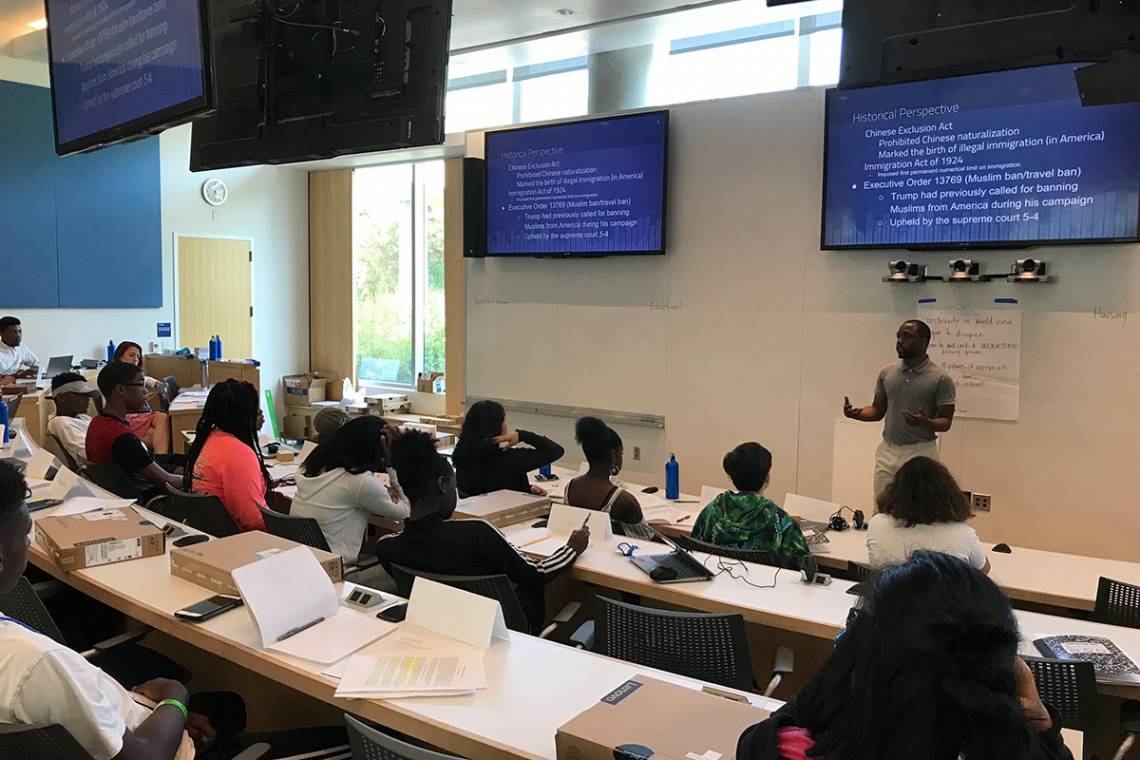Program Helps Durham Students Hone Writing, Research, Presentation Skills
Young Scholars Summer Research Institute Conference July 30

Were America’s Japanese-American internment camps considered a military necessity or a product of racial bias?
Middle and high school students from Durham Public Schools puzzled over the answer last week as they discussed immigration and its history in America during a session at the Hank & Billye Suber Aaron Young Scholars Summer Research Institute at Duke.
The free program – in its fourth year at Duke -- offers an educational enrichment experience to enhance their writing, research and presentation skills.
During their three-week session students met at the Nicholas School of the Environment to design and prepare original research presentations that focus on policy issues affecting inequality. The program material is selected by the teaching faculty in collaboration with scholars at Duke’s Samuel DuBois Cook Center on Social Equity, which hosts the institute.
“This is my fourth year teaching in the program and every year I’m drawn back. The research the students do is so powerful and profound,” said institute educator Raymond Beamon. “One of the things that I really enjoy about the program is students have the autonomy to research any topic they would like to cover. It excites me to see students have such inquisitive minds and execute their research in a way to help educate others.”
During this session, the classroom that was once silent filled with the echoing sound of a propaganda video about the internment camps of the 1940s. The video was a part of Beamon’s lesson to teach students about immigration then and now.
After watching the video, Beamon created a group participation activity. With the assistance of another educator and student interns, Beamon asked his students to separate into two groups.
“If you think the Japanese-American internment camps were (A) military necessity go stand on the left side of the classroom,” Beamon said. “If they were (B) a product of racial bias stand on the right side.” Students separated instantly. 
Jonathan Humphrey was one of the students who believed the int
ernment camps were a military necessity. He said before watching the video he felt the camps were created for protection purposes and afterwards felt the video only emphasized his point. Although Humphrey believed the camps back then were for national security, he does not agree with today’s immigration policies.
For some students in the program, the quest for research on social issues does not end after completing the course. Internship positions are set in place for students who would like to continue to see the program grow.
Riverside High School rising junior Rachel Ruff was once in the same seat many first-time students sit in today.
“When I first heard of the program it was through my mom. She did not force me to come but it was not something I was interested in before,” said Ruff. “After I completed the first year I knew I had to come back because of what I was learning. You have to trust the process. Now my family refers to me as the social advocate of the family and I don’t mind it at all.”
Ruff said the program is the reason why she now spends her time advocating for student rights and educational inequality at her high school.
The program has three cohorts. The students will present their summer research at Capstone Conference on July 30 at Duke’s Penn Pavilion.